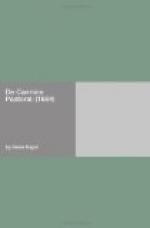Produced by David Starner, Louise Hope and the PG Online Distributed Proofreading Team
Series Two:
Essays on Poetry
No. 3
Rapin’s De Carmine Pastorali, prefixed to Thomas Creech’s translation of the Idylliums of Theocritus (1684)
With an Introduction by
J.E. Congleton
and
a Bibliographical Note
The Augustan Reprint Society
July, 1947
Price: 75c
* * * * *
GENERAL EDITORS
Richard C. Boys, University of Michigan
Edward Niles Hooker, University of
California, Los Angeles
H.T. SWEDENBERG, Jr., University of California,
Los Angeles
ADVISORY EDITORS
Emmett L. Avery, State College of Washington
Louis I. BREDVOLD, University of Michigan
Benjamin Boyce, University of Nebraska
CLEANTH Brooks, Louisiana State University
James L. Clifford, Columbia University
Arthur Friedman, University of Chicago
Samuel H. Monk, University of Minnesota
James Sutherland, Queen Mary College, London
Lithoprinted from copy supplied by author
by
Edwards
Brothers, Inc.
Ann Arbor, Michigan,
U.S.A.
1947
* * * * *
INTRODUCTION
Recent students of criticism have usually placed Rapin in the School of Sense. In fact Rapin clearly denominates himself a member of that school. In the introduction to his major critical work, Reflexions sur la Poetique d’Aristote (1674), he states that his essay “is nothing else, but Nature put in Method, and good Sense reduced to Principles” (Reflections on Aristotle’s Treatise of Poesie, London, 1731, II, 131). And in a few passages as early as “A Treatise de Carmine Pastorali” (1659), he seems to imply that he is being guided in part at least by the criterion of “good Sense.” For example, after citing several writers to prove that “brevity” is one of the “graces” of pastoral poetry, he concludes, “I could heap up a great many more things to this purpose, but I see no need of such a trouble, since no man can rationally doubt of the goodness of my Observation” (p.41).
The basic criterion, nevertheless, which Rapin uses in the “Treatise” is the authority of the Ancients—the poems of Theocritus and Virgil and the criticism of Aristotle and Horace. Because of his constant references to the Ancients, one is likely to conclude that he (like Boileau and Pope) must have thought they and Nature (good sense) were the same. In a number of passages, however,




